Quick and Effective Microsoft 70-415 Exam Preparation Options – Braindump2go new released 70-415 Exam Dumps Questions! Microsoft Official 70-415 relevant practice tests are available for Instant downloading at Braindump2go! PDF and VCE Formates, easy to use and install! 100% Success Achievement Guaranteed!
Vendor: Microsoft
Exam Code: 70-415
Exam Name: Implementing a Desktop Infrastructure
QUESTION 21
Your company has offices in New York and Sydney.
The network contains an Active Directory domain named contoso.com.
An organizational unit (OU) exists for each office.
The New York office contains a Virtual Desktop Infrastructure (VDI).
All of the users in the New York office access virtual desktops.
You need to recommend a virtual desktop deployment strategy for the Sydney office users.
The solution must meet the following requirements:
– User settings must be retained between sessions.
– All of the users must be assigned their own virtual desktop.
– Group Policies linked to the Sydney office OU must apply to all of the virtual desktops that are used by the Sydney office users.
What should you do?
A. Create a new managed personal virtual desktop collection.
B. Link a Group Policy object (GPO) to the Sydney office OU and specify the User Rights
Assignment settings.
C. Create a new managed pooled virtual desktop collection.
D. Link a Group Policy object (GPO) to the Sydney office OU and specify the Restricted
Groups settings.
Answer: A
Explanation:
According to Microsoft “Personal virtual desktops are permanently assigned to a user account and the user logs on to the same virtual desktop each time.”
What is a personal virtual desktop?
A personal virtual desktop is a virtual machine hosted on a Remote Desktop Virtualization Host (RD Virtualization Host) server and assigned to a user. Unlike a virtual desktop pool, where a virtual machine can be configured to rollback the changes when a user logs off, a personal virtual desktop retains all changes made by the user.
How do you assign a personal virtual desktop?
The Remote Desktop Connection Broker Manager (RD Connection Broker Manager) can be used to assign an unassigned virtual machine to a user. The assignment is stored in Active Directory. The assignment stays intact even after the user logs off from his or her assigned personal virtual desktop. An administrator can reassign a personal virtual desktop or make changes to the assignment through RD Connection Broker Manager.
http://blogs.msdn.com/b/rds/archive/2009/11/16/personal-virtual-desktops.aspx
http://deploymywindows.blogspot.com.es/2012/10/windows-server-2012-virtual-desktop_9500.html
QUESTION 22
Your network contains an Active Directory domain named contoso.com.
The domain contains a Virtual Desktop Infrastructure (VDI).
The VDI contains four servers.
The servers are configured as shown in the following table.
You need to recommend a solution to track the amount of time required to create virtual desktops.
What should you include in the recommendation?

A. From Event Viewer on Server2, enable Analytic and debug logging.
B. From Event Viewer on Server1, enable Analytic and debug logging.
C. From Group Policy Object Editor on Server2, configure the Advanced Audit Policy.
D. From Group Policy Object Editor on Server1, configure the Advanced Audit Policy.
Answer: B
Explanation:
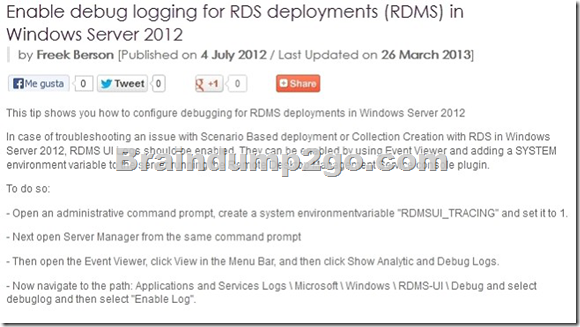
http://www.virtualizationadmin.com/kbase/VirtualizationTips/DesktopVirtualization/MicrosoftVirtualDesktopInfrastructureTips/General/EnabledebugloggingforRDSdeploymentsRDMSin
WindowsServer2012.html
QUESTION 23
Your company has a main office and a branch office.
The network contains an Active Directory domain named contoso.com.
The domain contains two servers named Server1 and Server2 that run Windows Server 2012.
Server1 has the Windows Server Update Services server role installed and configured.
Server1 is located in the main office. Server2 is located in the branch office.
You plan to install Windows Server update Services (WSUS) on Server2.
You need to configure the update infrastructure to meet the following requirements:
– Only updates approved by the administrator in the main office must be installed on client computers in the branch office.
– The local administrator in the branch office must not be able to approve updates.
– Bandwidth usage between the offices must be minimized.
What should you do?
A. Configure Server2 as a downstream server in autonomous mode.
B. On Server1, configure a computer group that contains the client computers in the branch
office, and then set the approvals to Automatic.
C. On Server1, configure a client computer group that contains Server2, and then set the
approvals to Automatic.
D. Configure Server2 as a downstream server in replica mode.
Answer: D
Explanation:
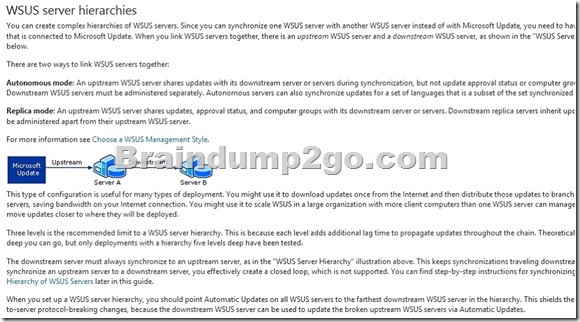
QUESTION 24
Your network contains an Active Directory domain named contoso.com.
The domain contains two servers named Server1 and Server2 that have the Windows Deployment Services server role installed.
You use Windows Deployment Services (WDS) to deploy operating systems to client computers. Server1 contains two boot images and two install images of Windows 8.
You copy the images to the appropriate WDS image folders on Server2.
You need to ensure that you can use the images on Server2 to install the client computers.
What should you do on Server2?
A. Run wdsutil.exe and specify the /bcdrefreshpolicy parameter.
B. Run bcdboot.exe and specify the /addlast parameter.
C. Run wdsutil.exe and specify the /resetbootprogram parameter.
D. Run bcdboot.exe and specify the fm parameter.
Answer: A
Explanation:
WDSUTIL/set-server/BcdRefreshPolicy/Enabled:yes/RefreshPeriod:<time in minutes> Causes the server to regenerate BCD stores in the \Tmp folder for all boot images.
If you do not configure this policy or if your refresh period is too long, network boots will fail with the following error message:
“The boot selection failed because a required device is inaccessible.” (0xc000000f).
This is because the server must be regenerate the corresponding BCD before a client can receive a boot image from the server.
QUESTION 25
Your network contains an Active Directory domain named contoso.com.
The domain contains a server named Server1 that has the Windows Deployment Services server role installed.
Server1 hosts a single install image of Windows 8 (x64) and 200 driver groups.
Each driver group has a different set of filters configured.
You are preparing to deploy windows 8 to a new hardware model.
You need to recommend a solution to identify which drivers from the existing driver groups will be deployed to the new hardware model.
What should you do first?
A. Create a prestaged device.
B. Create a capture image.
C. Install Microsoft Deployment Toolkit (MDT) 2012.
D. Install the Microsoft Assessment and Planning (MAP) Toolkit.
Answer: A
Explanation:
The Expected Deployment Results Wizard is a new feature in Windows 2012 Server WDS, which allows administrators to view deployment information-such as the set of matching driver groups that would be sent to a prestaged device.
It enables administrators to model the process of deploying a computer and seeing what boot images, install images, driver groups the computer will be offered from the server. It is designed to help administrators efficiently test configuration changes to their servers and see how they impact deployments to all or specific (prestaged) computers. The tool is especially valuable when used to test some of the advanced configuration options afforded by the WDS infrastructure for custom deployments.
QUESTION 26
Drag and Drop Question
Your network contains an Active Directory domain named contoso.com.
The domain contains a file server named Server1.
Server1 contains a shared folder named Share1.
The domain has Microsoft System Center 2012 Configuration Manager deployed.
All client computers run Windows 7.
You plan to upgrade all of the client computers in the marketing department to Windows 8.
You will migrate the user settings by using the User State Migration Tool (USMT).
You need to capture the user state on each client computer.
The solution must exclude offline files from the captured data.
Which three actions should you perform? To answer, move the three appropriate actions from the list of actions to the answer area and arrange them in the correct order.
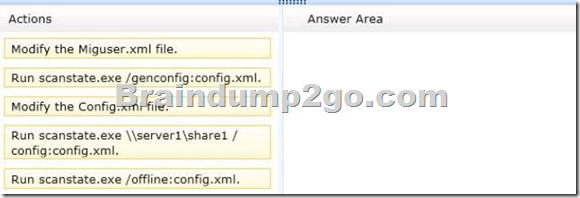
Answer:
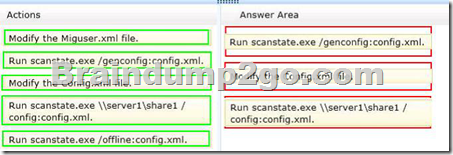
QUESTION 27
Your network contains an Active Directory domain named contoso.com.
The domain contains a server named Server1 that has Microsoft System Center 2012 Configuration Manager installed. All client computers run Windows 7.
You plan to deploy Windows 8 to all of the client computers.
You discover that the Client Replace Task Sequence task sequence is unavailable from the Configuration Manager console.
You need to ensure that the Client Replace Task Sequence task sequence is available from Configuration Manager.
What should you install on Server1?
A. The Windows Automated Installation Kit (Windows AIK)
B. The System Center 2012 Configuration Manager Toolkit
C. The Windows Assessment and Deployment Kit (Windows ADK)
D. Microsoft Deployment Toolkit (MDT) 2012
Answer: D
Explanation:
The Client Replace Task Sequence will only be available if we integrate MDT in SCCM:
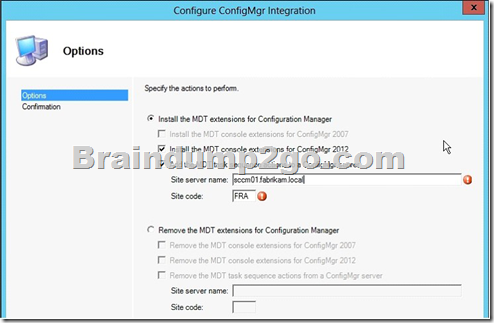
QUESTION 28
Your company has a main office and five branch offices.
The network contains an Active Directory domain named contoso.com.
The domain contains 500 client computers.
All of the client computers run Windows 7.
An Active Directory site exists for each office.
You plan to deploy a custom image to the client computers.
You need to recommend a deployment solution to meet the following requirements:
– Each computer must be able to download the image from a server in the local office.
– User interaction during the deployment must not be required.
– You must be able to deploy the images after business hours.
What should you include in the recommendation? More than one answer choice may achieve the goal. Select the BEST answer.
A. Deploy Microsoft Deployment Toolkit (MDT) 2012 in the main office and a Windows
Deployment Services (WDS) server in each office.
B. Deploy Microsoft System Center 2012 Orchestrator in the main office and a Windows
Deployment Services (WDS) server in each office.
C. Deploy Microsoft System Center 2012 Configuration Manager in the main office and a
distribution point in each office.
D. Deploy Microsoft Deployment Toolkit (MDT) 2012 and Microsoft System Center 2012
Configuration Manager in each office.
Answer: C
QUESTION 29
Drag and Drop Question
Your network contains an Active Directory domain named contoso.com.
The domain contains a server named Server1 that has Microsoft System Center 2012 Configuration Manager installed.
Configuration Manager has all of the system roles enabled.
The domain contains 500 client computers that run Windows XP.
You need to install Windows 8 on all of the client computers by running a full installation from a Configuration Manager task sequence.
The solution must meet the following requirements:
– All user state data must be copied to a secure network location before the installation of Windows 8.
– All user state data must be retained on the network after the installation of Windows 8.
Which five actions should you include in the task sequence? To answer, move the five appropriate actions from the list of actions to the answer area and arrange them in the correct order.
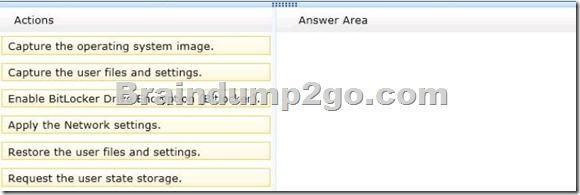
Answer:
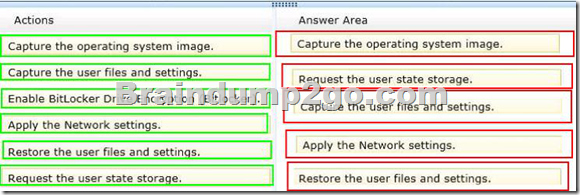
QUESTION 30
Your network contains an Active Directory domain named contoso.com.
You have 20 secure client computers that do not have DVD drives or USB ports.
The client computers run Windows XP and use an application named Appl.
App1 only runs on Windows XP.
The client computers have multiple partitions.
You need to configure the client computers to dual-boot between Windows XP and Windows 8. You copy the Windows 8 source files to a network share.
What should you do next from the network share?
A. Copy Install.wim to the local hard disk drive, and then run bcdedit.exe.
B. Copy Boot.wim to the local hard disk drive, and then run bcdboot.exe.
C. Run dism.exe.
D. Run setup.exe.
Answer: D
Instant Download Braindump2go New Released Microsoft 70-415 Exam Dumps PDF & VCE! Enjoy 1 year Free Updation! 100% Exam Pass Guaranteed Or Full Money Back!



